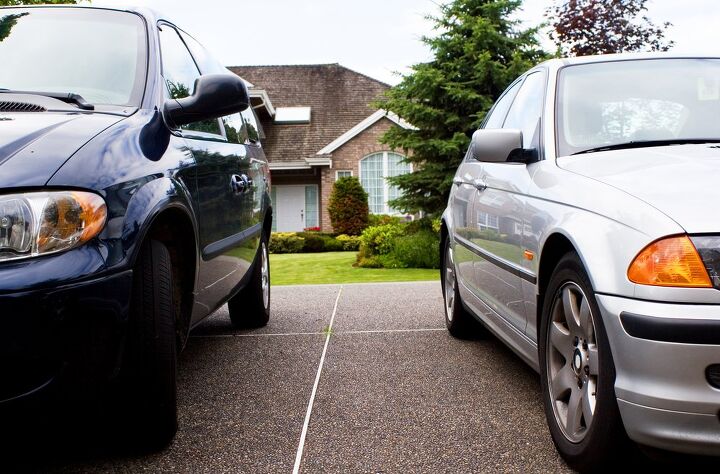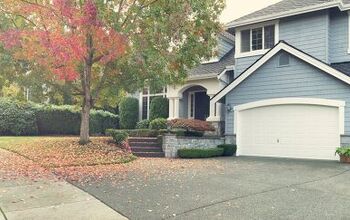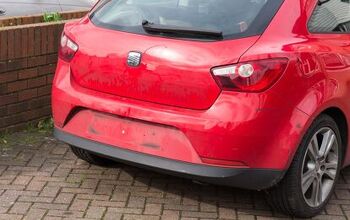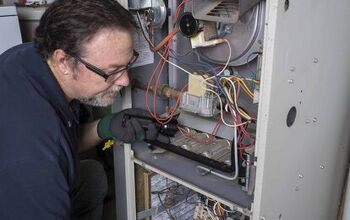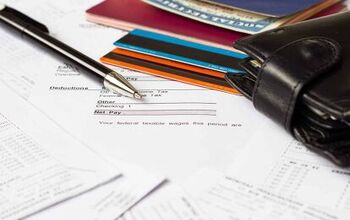Is It Illegal To Park In Front Of Your Own Driveway? (Find Out Now!)

Your driveway is part of your private property, so you can use it anyway you want, right? Unfortunately, this is not the case. Two situations that often arise with regards to driveways are parking in front of and blocking one’s own driveway.
It is illegal to park in front of your own driveway. You don’t own the road easement. This is a section of land that is owned by the city, and you are granted rights to use it for your driveway. Blocking your own driveway is also illegal. Law enforcement has the right to uphold traffic laws to protect public safety.
Let’s take a closer look at property rights, road easements, and traffic laws as they relate to driveways.
Do You Need a Brick and Stone Floor Contractor?
Get free, zero-commitment quotes from pro contractors near you.

Driveways: Are They Really Private Property?
Are driveways private property? Well, yes and no. Your driveway is considered within the boundaries of your property line. Yet, the city, county, municipality, or state owns part of the land that is used for your driveway.
Road Easements
Your driveway may be partially on private land and partially on public land. The part that starts at your garage or parking space to about 15’ from the road is your private property. The land from that point to the curb is a road easement. This section of land is owned by the city, and the city grants use to you for part of your driveway.
Although the distance from the road to a private property line varies, the concept is the same in almost any residential setting. The city, town, municipality, county, or state owns a portion of the land from the side of the road to your property line. Why? To allow for sidewalks and other types of pedestrian access.
Is It Illegal to Park in Front of Your Own Driveway?
When you park in front of your driveway, you are parking on a public road. Remember, too, that your property line doesn’t start for about 15’ from the edge of the road. Therefore, parking in front of your driveway means that your are blocking access to what is essentially public, or city-owned, property.
What is Considered Blocking Your Driveway?
Blocking your driveway means several different things. It can mean parking in front of your driveway and parallel to the roadway. It can also mean parking at the entrance of your driveway rather than pulling all the way onto your property.
If you have family and friends over for the holidays, and the vehicles fill your driveway to the road, this is considered blocking your driveway. Even having a large moving truck in front of your house that is longer than your driveway can be considered blocking your own driveway.
Is It Illegal to Block Your Own Driveway?
In most areas, it is illegal to block your own driveway. The best approach is to check with local law enforcement to find out what is considered blocking your own driveway. If you live in a private community with a homeowner’s association, check with them as well. Most private communities have rules about these types of matters.
Why is It Illegal to Block Your Own Driveway?
Laws regarding blocking driveways are in place for public safety. Check with local law enforcement is you have questions about traffic laws in your area.
Sidewalks and Pedestrians
Sidewalks and paths along public roads are intended to give pedestrians a safe place to walk. Parking in front of your driveway limits access to the sidewalks. Parking across a sidewalk means that pedestrians have to come onto your property or walk in the road to get around your vehicle.
Related Guide: Can You Park Over The Sidewalk In Your Driveway?
Traffic Flow
Parking in front of your driveway or in a way that leaves part of your vehicle in the road, you are blocking traffic. Cars and other vehicles cannot safely stay within the designated lanes of the road.
Collisions
Many residential streets are only wide enough for two lanes of traffic. Parking in front of your driveway or blocking your driveway gives other vehicles less room to safely drive.
Emergency Vehicles
Emergency vehicles, such as fire trucks and ambulances, need more space than the average car. These vehicles also need to be able to access private property in case of emergencies. If you block your driveway or park in front of your driveway, emergency personnel lose critical time should there be someone who needs help.
Are There Times When It is OK to Block Your Own Driveway?
There are specific situations in which it is OK to park in front of or block a driveway, but only on a temporary basis.
- You need to avoid a collision
- Law enforcement requires you to pull over
- You need to make room for emergency vehicles
- You are complying with traffic-control devices, such as stop lights and stop signs
What to Do If You Need to Block Your Own Driveway
Life happens, and there are times when it may be necessary to block your own driveway. In these situations, it is best to be proactive. Call the non-emergency phone number for local law enforcement. Discuss the situation to find solutions and alternatives. Also speak with your neighbors. If you live in a private community, talk with someone from the homeowner’s association.
What About Friends and Family Blocking Your Driveway?
Having friends and family come to your house is a special time. You don’t want to occasion ruined by traffic tickets, towed vehicles, and upset neighbors. There are a few creative ways that you can have guests and abide by traffic laws.
Carpool
Ask your guest to carpool. This limits the number of vehicles at your event. Be prepared to let people park on your lawn if the driveway is not big enough.
Shuttle Buses
Shuttle buses are quite affordable considering the convenience for your guests. You can rent a shuttle minibus for $90 to $170 per hour. Have your guests meet the minibus at specific pickup points.
Public Parking Areas
Contact your city to see if you can rent out a public parking space for the evening. You can also check with local business that have larger parking lots. Have your guests park at the lots, and then arrange for a shuttle service to your home.
Related Questions
What are property easements?
An easement is when someone has the right to use property that is owned by another person or entity. The four most common types of easements are private easements, prescriptive easements, utility easements, and easements by necessity.
Who is responsible for maintaining an easement?
In most areas, the person or business who uses the easement is responsible for maintaining it. This may not necessarily be the owner of the easement. This is why you may be required to mow the grass between your property line and the road. It is common, though, for the owner of the property to be responsible for maintaining the easement.
Do You Need a Brick and Stone Floor Contractor?
Get free, zero-commitment quotes from pro contractors near you.

Summary
It is illegal to park in front of and block your own driveway. In every residential neighborhood, there is a section of land that starts at the edge of the road and extends to your property. This land is owned by the city, county, or state, and it is considered public property.
Blocking your driveway is illegal for a few reasons, all of which are related to public safety. First, you interfere with the safe operation of vehicles on the road. This increases the chances of collisions and accidents involving pedestrians and bicyclists.
Second, you block sidewalks and walkways that are used by pedestrians. Anyone walking has to come onto your property (trespass) or walk in the roadway. Third, parking in front of your driveway or blocking it prevents emergency vehicles from getting to people who need help.
If you need to block your driveway, call the non-emergency number for law enforcement to find out what is acceptable. Also, check with the homeowner’s association if you live in a private community.

Jennifer L. Eggerton loves being hands-on, whether it's with a home DIY project, making repairs, re-decorating a room, or keeping life organized. She enjoys helping people by sharing her knowledge, insights, and experiences, as well as her lessons learned. In addition to her work as a writer, Jennifer is a Jeep® overlander, self-published author, and nature photographer who loves being outdoors.
More by Jennifer Eggerton



